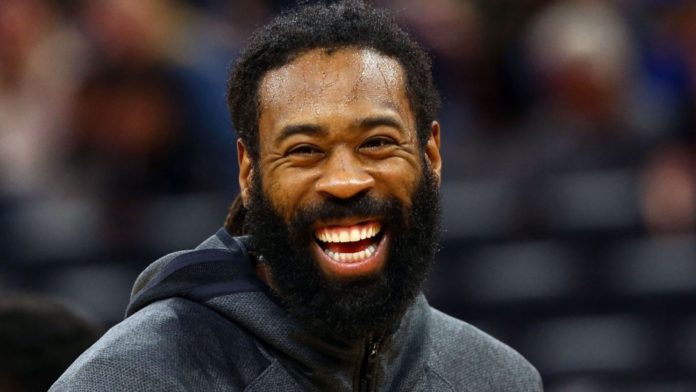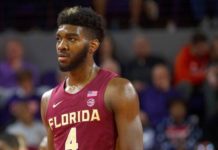DEANDRE JORDAN NEEDS to fix Jarrett Allen‘s Afro.
“The Star-Spangled Banner” has played in Barclays Center, the opposing team’s starters have been introduced and booed by fans, the Nets’ player-introductions video has concluded, the team huddle has commenced and broken up and the buzzer has sounded. But before any NBA game can begin, Jordan has to finish.
In this moment, Jordan is a barber. He examines the front of Allen’s coils and pretends to fluff up the sides of his hairdo. He nods curtly and moves on to Garrett Temple. Jordan transforms into a seamstress and eyes Temple’s imaginary suit with the precision of an haute couture designer. He straightens Temple’s fanciful tie and moves on to his next subject.
Jordan turns to Spencer Dinwiddie and becomes … Professor Jordan — who holds up a fictitious, invisible notepad in front of his face and jots down bullet points.
“You know, because he is so smart, he could’ve gone to Harvard,” Jordan explains.
Jordan then faces Taurean Prince, curls each of his index fingers and thumbs in to meet each other and raises them to his temples (meant to be a 3-point symbol). Next up, Joe Harris — another 3-point specialist. But because no two greetings can be the same, Jordan and Harris high-five with their hands curled into 3-point signs.
It goes on like this, player after player, each and every starter for the Nets. Jordan performs an individualized handshake that involves very little hand shaking. The entire ritual takes just 20 seconds.
The routine seems silly — and in many ways it is. Jordan is the comic relief of Brooklyn’s locker room. Before a game against the Miami Heat in November, he warmed up by doing pullups on the rim and catching football-style passes from Temple. At one point, when coach Kenny Atkinson called a timeout, Jordan jumped onto Theo Pinson‘s back piggyback-style and rode his teammate out onto the court to give Allen some pointers.
Jordan is the self-appointed locker room mediator, tension reliever and humorist. He has a unique ability to make people he talks to less guarded. He is the guy who stands behind reporters and heckles his teammates as they do postgame news conferences.
These are the intangibles that make DeAndre Jordan so valuable to the Brooklyn Nets — and the league’s highest-paid best friend.
TRAVEL AROUND THE NBA and you’ll find a handful of players who are almost universally beloved — by their teammates, coaches, fans, even arena security guards. Jordan tops that list. He was popular at Texas A&M. With the LA Clippers, he was the goofy guy who did impersonations of his teammates. He and teammate JJ Redick would listen to music and whack golf balls into the valley below Jordan’s Pacific Palisades home.
“[The community] alerted us to the fact that there were cars, houses and horses down there,” Redick says now. “He did slice a ball that hit Ben Affleck and Jennifer Garner’s roof. It was across the canyon, and we watched it hit their roof.”
Blake Griffin liked him so much that Jordan was “locked” in a house to prevent him from signing with the Dallas Mavericks in 2015. (“It was my own house, by the way,” Jordan says, laughing.) And when Jordan returned to free agency three seasons later, he didn’t believe his agent, Jeff Schwartz, when he told him the Mavs were interested again.
“I was like, ‘Get the f— out of here,'” Jordan says. “Very funny, but let’s go through the teams. He’s like, ‘I’m serious. They are really adamant about you coming.’ I was just like, ‘Why? After that s—, they really want me to come?'”
They really did.
The Mavs would ultimately trade Jordan to the New York Knicks, where he would again become a locker room favorite — the type of teammate who took it upon himself to bring rookie center Mitchell Robinson out of his shell.
“I was like, ‘Man, you got a big-ass nose,'” Jordan says, laughing. “He was like, ‘What?!’ And I was like, ‘Yeah, let me look at it from the side,’ and then he started laughing. For the two months I was there, it was like, ‘Mitch won’t f—ing shut up!'”
That look-at-the-bright-side, give-hugs-freely, always-ready-to-crack-a-joke outlook has helped Jordan unlock friendships with some of the league’s most notoriously prickly stars.
Jordan hears the criticism that he’s too slow for the modern NBA. Too heavy-footed, too old. His best days, they say, are far behind him. When he signed with the Nets, he was branded as the expensive add-in — a necessary price to get two superstars.
Nets general manager Sean Marks says Brooklyn liked Jordan as much for his constant wisecracking as his ability to swat shots. Jordan’s experience, coupled with his defensive prowess and potential to guide Allen, made him attractive to the team.
And being close with the Nets’ supermax duo didn’t hurt.
“We knew we were wading through some uncharted waters where we’ve never been before — where expectations are a little bit bigger,” Marks says. “To have a guy like DJ, who can hopefully keep the mood light behind the scenes is — it’s really important.”
In addition, both Kyrie Irving and Kevin Durant took less guaranteed money to make the deal possible.
Heading into 2019 free agency, ESPN insiders projected Jordan to command a starting salary of $6-8 million if he signed a short-term deal, based on conversations with league executives. Instead, Brooklyn exercised cap gymnastics to lock down Jordan for a total of $40 million over four years — a contract that will run through his age-34 season.
“We’re going to be a tax team,” Marks says. “We are married to that. There’s a limited amount of times and ways you can continue to add to your team. You better do it now. You’re gearing up for a run.”
When pressed about the notion that he’s valued for his friendships over his abilities, Jordan shrugs.
“As long as I’m respected by my peers and coaches, I’m cool,” Jordan says.
JORDAN, WHO HAS spent the majority of this season backing up Allen, will often sit nestled between Durant and Irving on the bench during games. When Durant does exercises with bands to strengthen his surgically repaired Achilles, Jordan lies on a training table nearby to chat with his friend. When Irving visits specialist after specialist to try to solve the pain from an impinged nerve in his shoulder, Jordan sends the guard supportive — and sometimes silly — text messages.
The Nets’ 2019 free agency “big three” solidified their friendship during the 2016 Olympics, a month that included late-night conversations ranging from basketball to family.
“We have the ultimate confidence in our ability to develop our relationship off the floor, to be able to protect each other as brothers and engage in family time and other things that we missed out during years we were other places,” Irving told ESPN’s Jackie MacMullan in October.
So when Durant and Irving declared their intent to sign with Brooklyn on June 30, Jordan’s deal was solidified hours later. Marks said that while Durant and Irving lobbied to have Jordan on the roster, the Nets had already been targeting Jordan.
“We are going to benefit from having him around,” Marks says. “So, it is not fair to call him a throw-in.”
Ironically, the trio has been able to build rapport this season only off the court. Jordan is the only man healthy enough to see steady playing time this season.
“I definitely wish they were playing,” Jordan says. “But I’ll tease them like, ‘Damn, I know y’all don’t have any more suits left.’ I just want to be able to make sure they’re having fun, too. And Caris [LeVert], too, when he was out. Just keep it light and make sure that guys aren’t too down and thinking about how long they’re going to be out.”
His happy-go-lucky attitude and open-mindedness, Jordan says, are why he gets along with a guy like Irving. The All-Star guard has infamously clashed with former teammates.
“I think he gets an unfair judgment before people even know him,” Jordan says. “That’s the thing, you have to get to know Ky. Ky is very complex, but he is also a very caring, loving guy. He talks to my son every day. He don’t have to do that.”
JARRETT ALLEN LEANS back in the chair in front of his locker in Barclays Center — his hair has not yet had its pregame inspection. He is being asked about Jordan.
“Ah, the jokester,” the 21-year-old center says. “What do you want to know?”
How has Jordan’s presence helped or hindered you?
The usually reserved, soft-spoken Allen launches into a story: It was January, before a game against the Orlando Magic. Allen says he was going through his pregame warm-ups when Jordan appeared with some advice about guarding Nikola Vucevic.
With Jordan simulating Allen and Allen mimicking Vucevic, Jordan guided him through a few maneuvers, arms extended and fingers spread wide.
“I did exactly what he said in the game and got the steal off of it,” Allen says. “The first thing I did was point to him on the bench, because he did help me out.”
“On the bench.” That’s where Jordan spends most of his time on these Brooklyn Nets. Which could well be a hard position to assume for a three-time All-NBA player and a man who was an All-Star as recently as three seasons ago.
“It is tough as hell [to come off the bench],” Jordan says. “I battle with it daily. But I knew at some point in my career, at some point I was going to have to come off the bench. I didn’t think it was going to be now. I still don’t think it’s now. But this is the hand I was dealt. I could be an a–hole, but then if Jarrett isn’t playing well, then our team is not playing well.”
“If he was thinking about being a d—, he hid it well,” Allen says, laughing. “He has been nothing but helpful.”
Figuring out how to help the team play well is front of mind for the 31-year-old center. For now, it’s setting screens, grabbing rebounds and helping Allen improve his game.
And with Irving returning this past Sunday after a 26-game absence because of a right shoulder impingement, the move of Irving’s locker from the corner of the locker room to the center — to the left of Jordan’s — is conspicuous.
A best friend’s work is never done.
Source : ESPN













